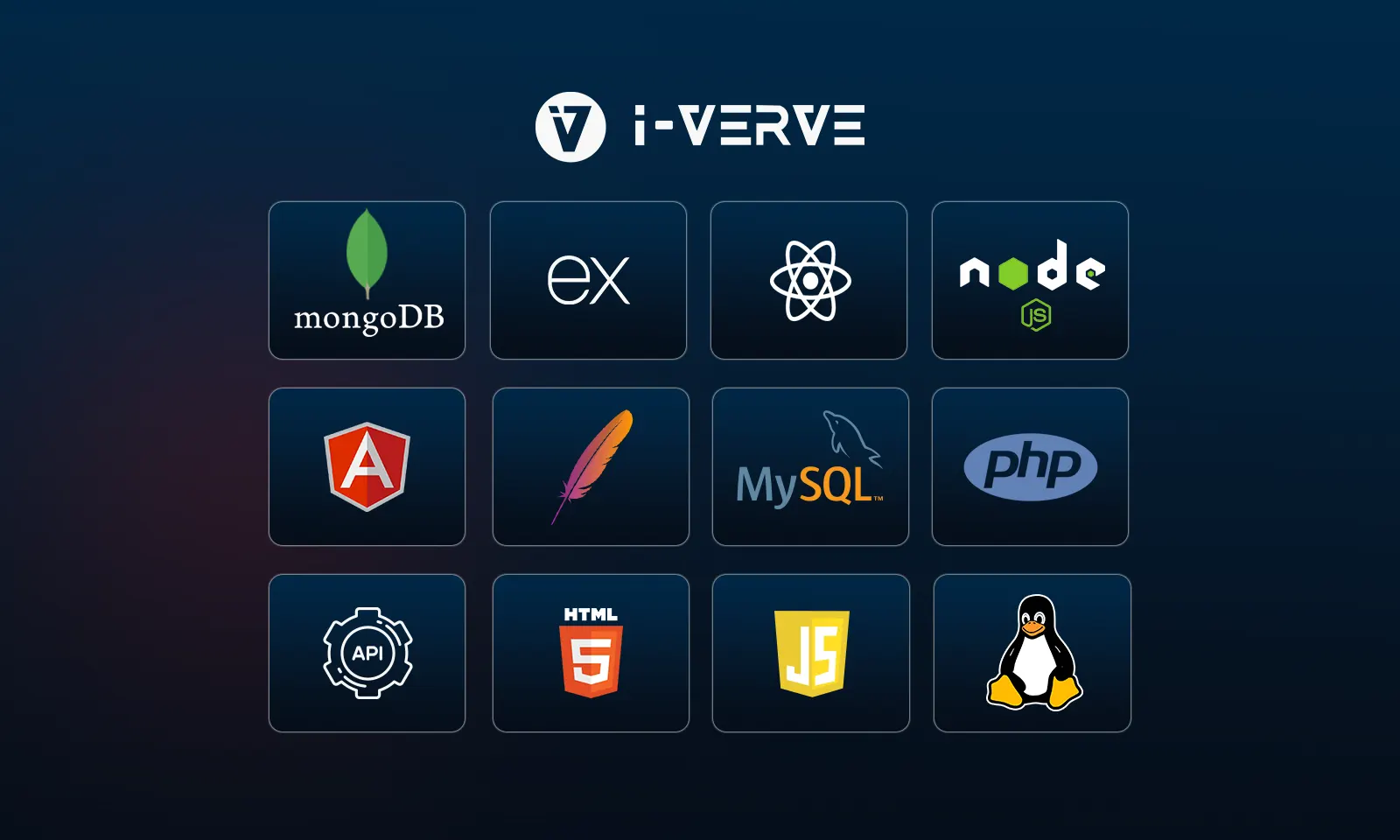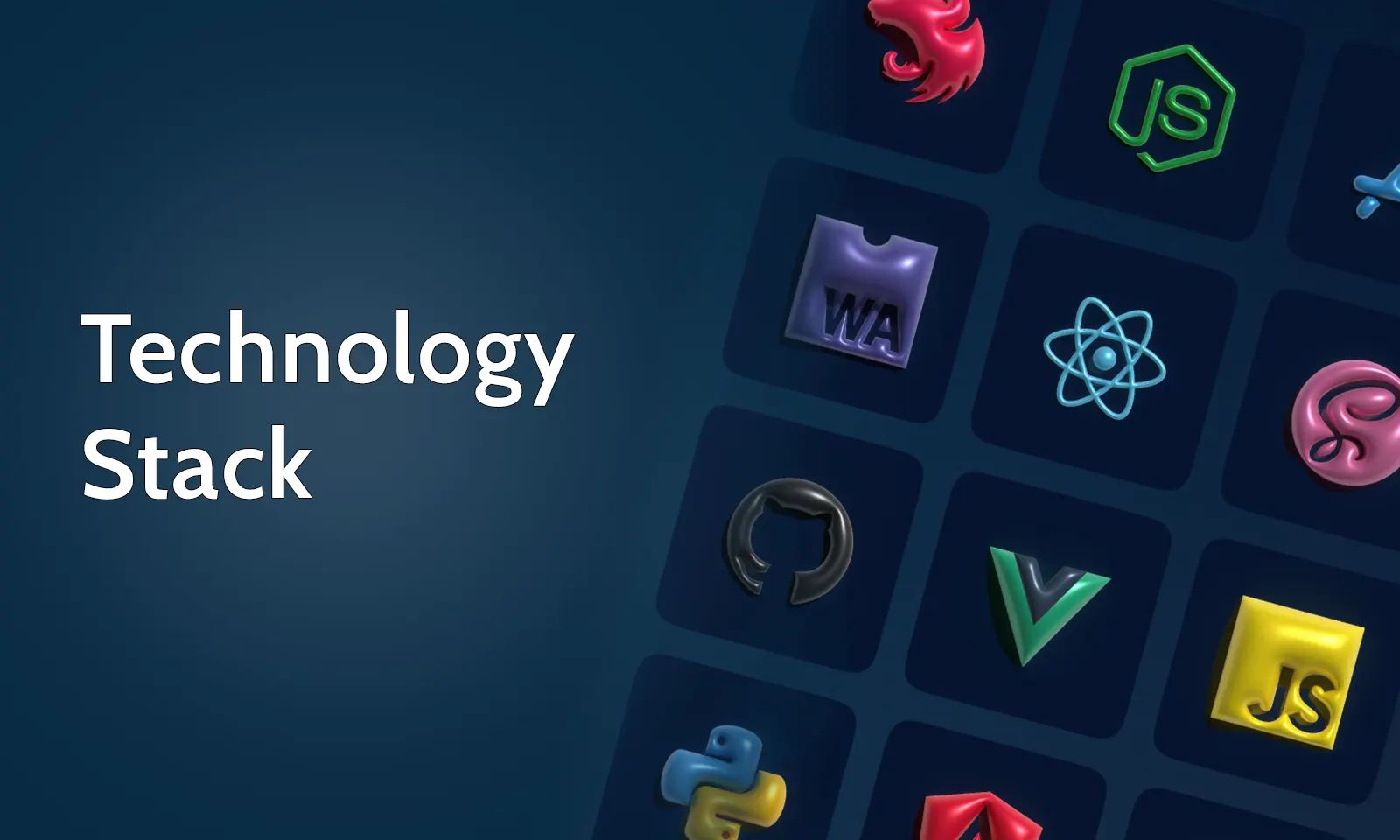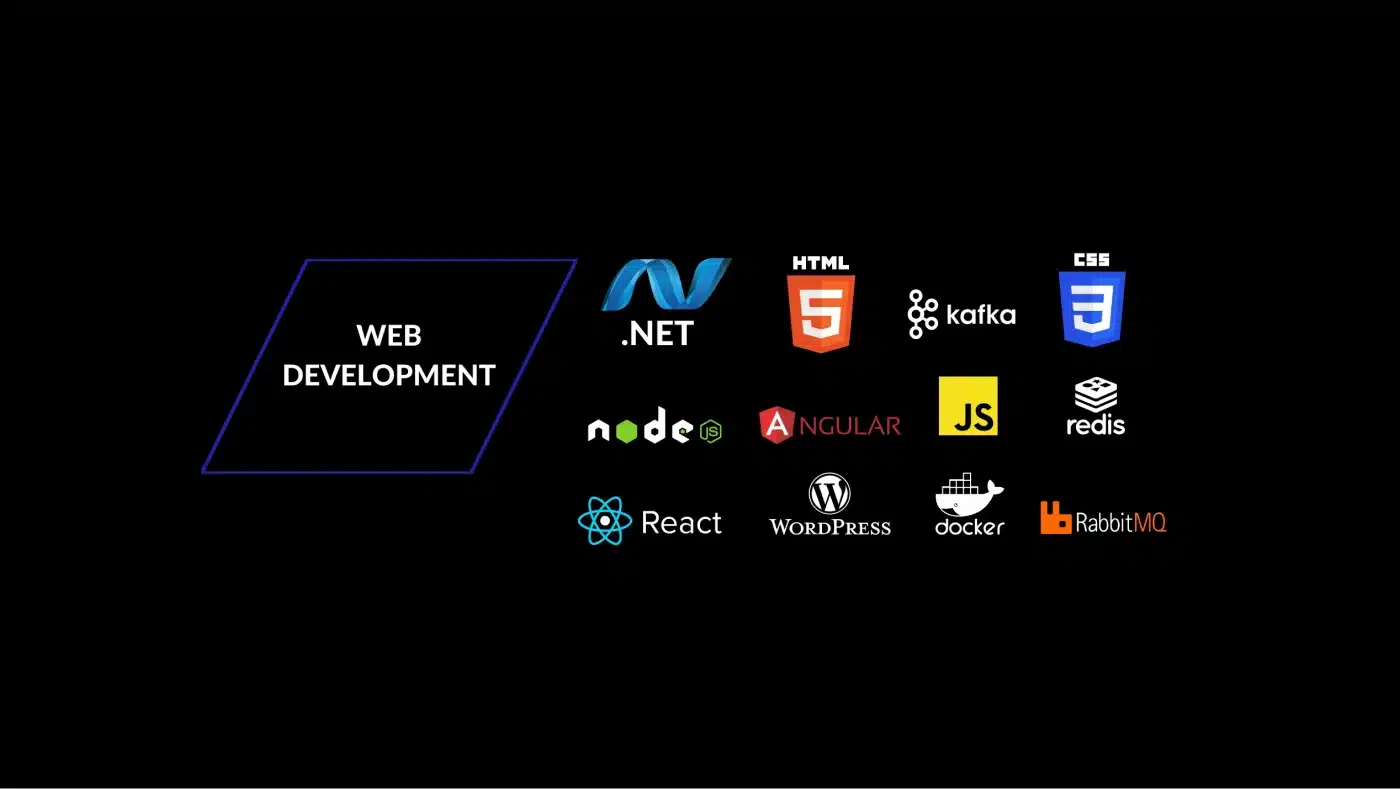
Choosing the right tech stack is crucial for startups, as it directly impacts scalability, performance, and long-term success. A well-chosen stack accelerates development, reduces costs, and enhances user experience, while the wrong choices can hinder growth and create technical debt.
At i-verve, we guide startups through this decision with tailored tech stack recommendations. This guide compares popular stacks, key considerations, and future trends to help startups build scalable, future-proof solutions.
What Is a Tech Stack?
A tech stack refers to the combination of technologies, frameworks, and tools used to develop and deploy a software application. It consists of three main layers:
- Front-End (Client-Side): The part of the application that users interact with directly. It includes technologies like HTML, CSS, and JavaScript frameworks such as React, Angular, or Vue.js.
- Back-End (Server-Side): The server, application logic, and database that power the front-end. This includes languages like Node.js, Python, Ruby, and PHP, along with databases like MongoDB, MySQL, and PostgreSQL.
- Cloud Infrastructure: The platforms and services that host and scale the application. This layer includes cloud providers such as AWS, Microsoft Azure, and Google Cloud, offering services like virtual machines, databases, and serverless computing.
A well-chosen tech stack allows startups to optimize their development processes, ensure scalability, and deliver a seamless user experience. However, selecting the right tech stack requires a thorough understanding of the project’s requirements and long-term goals.
Why Is a Tech Stack Important for Startups?

The right tech stack is crucial for a startup’s success, impacting development speed, scalability, and user experience. The right choice drives growth, while the wrong one risks technical debt, performance issues, and costly reworks.
Below are the key reasons why choosing the right tech stack is critical for startups:
-
Accelerate Time-to-Market
Time is of the essence for startups. The faster you can build and launch your Minimum Viable Product (MVP), the sooner you can gather feedback, validate your idea, and iterate on your solution. Choosing the right tech stack ensures you can develop and deploy features quickly without compromising quality.
- Modern Frameworks: Using frameworks like React, Vue.js, or Node.js allows startups to speed up development through pre-built components and libraries.
- Automation Tools: DevOps tools such as Jenkins, Docker, and CI/CD pipelines automate testing, deployment, and scaling, reducing the time spent on manual tasks.
- Agile Development: A tech stack that supports agile methodologies allows for faster iterations and continuous improvement.
-
Ensure Scalability
Scalability is crucial for startups that anticipate rapid growth. A scalable tech stack allows your application to handle an increasing number of users, data, and transactions without compromising performance.
- Horizontal and Vertical Scaling: Choose a tech stack that supports both horizontal scaling (adding more servers) and vertical scaling (upgrading existing servers).
- Cloud Solutions: Platforms like AWS, Azure, and Google Cloud offer auto-scaling services, enabling your application to grow seamlessly.
- Microservices Architecture: Adopting a microservices approach makes it easier to scale individual components of your application independently.
-
Optimize Costs
Startups often operate on tight budgets, so optimizing costs without sacrificing quality is essential. The right tech stack can help manage expenses by leveraging open-source tools, serverless computing, and pay-as-you-go cloud services.
- Open-Source Technologies: Frameworks like Django, Laravel, and Flask reduce licensing costs.
- Serverless Solutions: Using platforms like AWS Lambda eliminates the need to manage servers, reducing infrastructure costs.
- Cloud Pricing Models: Pay-as-you-go cloud services ensure you only pay for what you use, making it easier to control expenses.
-
Enhance Security
Data security and compliance are critical, especially for startups handling sensitive user information. The right tech stack can help prevent security breaches and ensure compliance with industry standards like GDPR, HIPAA, and PCI DSS.
- Encryption: Ensure your stack includes robust encryption protocols for data at rest and in transit.
- Authentication: Implement secure authentication mechanisms such as OAuth, JWT, and Multi-Factor Authentication (MFA).
- Regular Updates: Choose frameworks and libraries that are actively maintained and updated to patch security vulnerabilities.
-
Leverage Team Expertise
The success of your chosen tech stack heavily relies on your team’s expertise. Even the most advanced stack will fail to deliver results if your team lacks the necessary skills to implement and maintain it effectively.
- Existing Skills: Evaluate your team’s current skills and knowledge to select a stack that aligns with their expertise. For instance, if your developers are proficient in JavaScript, consider choosing a stack like MERN or MEAN.
- Training and Learning Resources: Ensure the chosen tech stack has ample learning resources, documentation, and community support to help your team quickly adapt and grow their expertise.
- Hiring Considerations: Choose a tech stack that makes it easier to attract and retain top talent. Popular stacks with a large talent pool, like React, Node.js, or Python, can help reduce hiring challenges.
Need help understanding the best tech stack for your startup?
Visit our Product Engineering Services page to learn more about how i-verve can help you build scalable solutions.
Popular Tech Stacks for Startups: A Detailed Comparison

-
Web Development Stacks
- MERN Stack (MongoDB, Express.js, React, Node.js)
- Front-End: React.js is a popular JavaScript library for building user interfaces. It is known for its performance and flexibility in building single-page applications.
- Back-End: Node.js with Express.js provides a fast and scalable server-side framework.
- Database: MongoDB is a NoSQL database that handles large amounts of unstructured data efficiently.
- Use Cases: Ideal for building real-time applications, e-commerce platforms, and dynamic web apps.
- Pros:
- Full-stack JavaScript.
- High scalability.
- Open-source with a large community.
- Cons:
- Requires skilled developers familiar with asynchronous programming.
- Can have higher initial setup time.
- MEAN Stack (MongoDB, Express.js, Angular, Node.js)
- Front-End: Angular is a powerful front-end framework maintained by Google.
- Back-End: Node.js with Express.js.
- Database: MongoDB.
- Use Cases: Suitable for enterprise-level applications and SPAs.
- Pros:
- Strong performance for large-scale apps.
- Consistent coding structure across front-end and back-end.
- Cons:
- Steeper learning curve for Angular.
- More complex setup compared to other stacks.
-
LAMP Stack (Linux, Apache, MySQL, PHP)
- Front-End: HTML, CSS, JavaScript.
- Back-End: PHP is a widely-used server-side scripting language.
- Database: MySQL is a relational database management system.
- Use Cases: Great for CMS platforms, blogs, and e-commerce sites.
- Pros:
- Well-established and reliable.
- Easy to deploy and manage.
- Cons:
- Less suited for real-time applications.
- Not as scalable as modern frameworks.
-
JAMstack (JavaScript, APIs, Markup)
- Front-End: Static site generators like Gatsby and Next.js.
- Back-End: Uses API services instead of traditional servers.
- Use Cases: Ideal for fast, secure, and scalable websites.
- Pros:
- Improved performance and security.
- SEO-friendly.
- Cons:
- Requires multiple third-party services.
- Limited flexibility for complex applications.
- MERN Stack (MongoDB, Express.js, React, Node.js)
-
Mobile Development Stacks
- React Native
- Language: JavaScript.
- Use Cases: Suitable for cross-platform mobile apps.
- Pros:
- Code reusability across iOS and Android.
- Large community and library support.
- Cons:
- Performance may vary for complex apps.
-
Flutter
- Language: Dart.
- Use Cases: Ideal for high-performance, native-like apps.
- Pros:
- Hot reload feature for faster iterations.
- High performance.
- Cons:
- Smaller community compared to React Native.
-
Xamarin
- Language: C#.
- Use Cases: Great for enterprise apps.
- Pros:
- Integration with Microsoft tools.
- Native performance.
- Cons:
- Licensing costs.
- React Native
-
Cloud and Serverless Stacks
-
AWS (Amazon Web Services)
- Use Cases: Suitable for scalable, secure cloud infrastructure.
- Services: EC2, Lambda, S3.
-
Azure (Microsoft)
- Use Cases: Ideal for enterprise applications.
- Services: Azure Functions, Cosmos DB.
-
Firebase (Google)
- Use Cases: Real-time apps and serverless solutions.
- Services: Firestore, Firebase Authentication.
-
AWS (Amazon Web Services)
Still wondering which tech stack suits your startup?
Visit our Custom Software Development page to see how i-verve can help you choose and implement the right technology.
Emerging Tech Stacks to Watch

The technology landscape is constantly evolving, and startups must stay ahead by adopting emerging tech stacks that offer innovative solutions. These cutting-edge technologies can provide a competitive edge in today’s fast-paced market.
-
Serverless Stacks
Serverless architecture is becoming increasingly popular for startups looking to reduce infrastructure costs and streamline operations. In a serverless stack, the cloud provider manages the servers, allowing developers to focus solely on writing code.
- Key Technologies: AWS Lambda, Azure Functions, Google Cloud Functions.
- Benefits:
- Reduced operational costs.
- Automatic scaling.
- Faster time to market.
- Challenges:
- Vendor lock-in.
- Limited control over infrastructure.
-
AI-Powered Stacks
Artificial Intelligence (AI) is transforming industries, and startups can leverage AI-powered tech stacks to create smarter applications. AI can be integrated into various parts of a tech stack, including front-end personalization, back-end automation, and data analytics.
- Key Technologies: TensorFlow, PyTorch, OpenAI APIs.
- Benefits:
- Improved decision-making.
- Personalized user experiences.
- Automation of repetitive tasks.
- Challenges:
- Requires expertise in machine learning.
- Potential ethical concerns with AI usage.
-
Edge Computing Solutions
Edge computing brings data processing closer to the source, reducing latency and improving performance for real-time applications. This is especially important for IoT devices and applications that require instant responses.
- Key Technologies: AWS IoT Greengrass, Azure IoT Edge, Cloudflare Workers.
- Benefits:
- Faster response times.
- Enhanced security by reducing data exposure.
- Reduced bandwidth usage.
- Challenges:
- Requires specialized hardware.
- Complex to implement and maintain.
-
AR/VR Development Stacks
Augmented Reality (AR) and Virtual Reality (VR) are becoming mainstream in industries like gaming, real estate, and healthcare. Startups can use AR/VR stacks to create immersive experiences that captivate users.
- Key Technologies: Unity, Unreal Engine, Vuforia.
- Benefits:
- Enhanced user engagement.
- Innovative product experiences.
- Real-time interactivity.
- Challenges:
- High development costs.
- Requires specialized hardware and skills.
-
Blockchain and Web3 Stacks
Blockchain and Web3 technologies are reshaping how startups build decentralized applications (dApps). These technologies provide transparency, security, and decentralization, which are becoming increasingly important for users.
- Key Technologies: Ethereum, Solana, Polkadot.
- Benefits:
- Enhanced data security.
- Transparent transactions.
- Decentralized control.
- Challenges:
- Scalability issues.
- Regulatory concerns.
Want to explore cutting-edge tech stacks for your startup?
Visit our Digital Transformation Services page to learn how i-verve can help you stay ahead of the competition.
Key Considerations When Upgrading Your Tech Stack
As your startup grows, the tech stack you chose at the beginning of your journey may no longer meet your evolving needs. Upgrading your tech stack becomes essential to maintain performance, security, and scalability. Here are some key considerations to keep in mind when evaluating whether it’s time to upgrade your current tech stack:
-
Business Needs
Your tech stack should align with your current and future business goals. Regularly reassess whether your existing stack is capable of supporting your product roadmap and scaling with your business.
- Alignment with Product Vision: Ensure the tech stack can support new features and functionalities as your business evolves.
- Adaptability: The stack should be flexible enough to accommodate market changes and customer demands.
-
Performance Issues
A growing user base can strain your application if your tech stack isn’t optimized for performance. Assess your current performance metrics and identify areas where upgrades are needed.
- Slow Load Times: Identify bottlenecks that cause delays in response times.
- High Traffic Handling: Ensure your tech stack can handle traffic spikes without crashing or slowing down.
-
Security Requirements
Security threats evolve constantly. Your tech stack should be updated regularly to address new vulnerabilities and comply with the latest security standards.
- Data Protection: Implement robust encryption methods for data in transit and at rest.
- Compliance: Ensure your stack meets regulatory requirements like GDPR, HIPAA, and PCI DSS.
-
Scalability Needs
As your user base grows, your application must scale to meet demand. A tech stack that cannot scale efficiently will result in performance issues and downtime.
- Horizontal Scaling: Add more servers to handle increased traffic.
- Vertical Scaling: Upgrade existing servers to handle more load.
-
Developer Productivity
Your tech stack should empower your development team to work efficiently. Outdated or complex stacks can slow down development and increase technical debt.
- Modern Tools and Frameworks: Use tools that streamline development processes, such as CI/CD pipelines, automated testing, and containerization.
- Training and Documentation: Ensure your team has access to learning resources and documentation for continuous skill improvement.
Not sure if it’s time to upgrade your tech stack?
Contact i-verve for a free consultation through our Contact Us page!
Future Trends in Tech Stacks for Startups
Keeping up with future trends can help startups remain competitive and innovative. As technology rapidly evolves, startups need to be aware of emerging trends that can streamline development, improve scalability, and reduce costs. Here are some of the most promising trends to watch in tech stacks for startups.
-
Low-Code and No-Code Platforms
Low-code and no-code platforms are transforming the way startups build applications by reducing the need for extensive coding. These platforms enable faster application development, allowing non-technical founders and teams to create and launch products with minimal developer involvement.
- Key Platforms: OutSystems, Mendix, Bubble, Adalo.
- Benefits:
- Faster Development Cycles: Build applications in weeks rather than months.
- Reduced Dependency on Developers: Empower non-technical team members to contribute to development.
- Cost-Effective Solutions for MVPs: Ideal for startups looking to launch a Minimum Viable Product (MVP) quickly without significant upfront costs.
- Challenges:
- Limited flexibility for complex applications.
- Potential vendor lock-in with proprietary platforms.
-
Multi-Cloud Strategies
Startups are increasingly adopting multi-cloud strategies to avoid vendor lock-in and improve redundancy. By leveraging multiple cloud providers, startups can ensure greater reliability and flexibility.
- Key Cloud Providers: AWS, Google Cloud, Microsoft Azure, IBM Cloud.
- Benefits:
- Improved Reliability and Uptime: Minimize the risk of downtime by distributing workloads across multiple cloud providers.
- Greater Flexibility in Choosing Services: Access best-in-class services from different providers to meet specific business needs.
- Cost Optimization: Take advantage of competitive pricing across providers to reduce cloud expenses.
- Challenges:
- Complex management and integration across different cloud platforms.
- Security and compliance challenges when dealing with multiple providers.
-
Quantum Computing
Although still in its infancy, quantum computing has the potential to revolutionize industries by solving complex problems faster than traditional computing methods. Startups in specific sectors, such as healthcare, finance, and logistics, can benefit significantly from quantum advancements.
- Key Companies Leading Quantum Innovation: IBM Quantum, Google Quantum AI, D-Wave, Rigetti.
- Potential Use Cases:
- Drug Discovery: Accelerate the process of finding new drugs by simulating molecular structures.
- Financial Modeling: Optimize investment portfolios and risk management strategies.
- Cryptography: Develop more secure encryption methods to protect sensitive data.
- Challenges:
- High costs associated with quantum computing infrastructure.
- Limited availability of quantum programming skills.
-
AI-Driven Development
AI-powered development tools are reshaping the way startups build and maintain their applications. From automating code generation to predicting bugs and performance issues, AI can significantly enhance the development process.
- Key Tools and Platforms: GitHub Copilot, DeepCode, Tabnine.
- Benefits:
- Automated Code Suggestions: Speed up coding with AI-assisted suggestions.
- Bug Detection and Prevention: Identify potential issues before they become critical.
- Performance Optimization: Use AI to analyze performance data and recommend improvements.
- Challenges:
- Ethical concerns related to AI-generated code.
- Dependence on AI tools may reduce developers’ manual coding skills.
-
Decentralized Applications (dApps) and Web3
The rise of blockchain technology and Web3 is leading to a shift toward decentralized applications (dApps). Startups in industries like finance, real estate, and supply chain management are exploring decentralized solutions to increase transparency and security.
- Key Technologies: Ethereum, Solana, Polkadot, Avalanche.
- Benefits:
- Increased Security and Privacy: Data is stored on a decentralized network, reducing the risk of data breaches.
- Transparency: Blockchain’s immutable ledger ensures transparency in transactions.
- Ownership and Control: Users have more control over their data and assets.
- Challenges:
- Regulatory uncertainty surrounding blockchain and cryptocurrencies.
- Scalability issues with some blockchain networks.
Stay ahead of future trends with i-verve expert guidance.
Visit our Insights page to learn more.
How i-verve Helps Startups Adopt Emerging Tech Stacks
At i-verve we specialize in helping startups adopt the latest technologies to stay competitive and innovative in an ever-changing market. Our holistic approach ensures that startups not only choose the right tech stack but also implement and maintain it effectively to drive long-term success. Below is a deep dive into how i-verve supports startups in adopting emerging tech stacks and the unique value we bring to the table.
-
Comprehensive Technology Consultation
The journey to adopting an emerging tech stack begins with understanding your startup’s unique needs, challenges, and growth ambitions. At i-verve, we provide personalized technology consultation to help you navigate the vast landscape of available technologies and choose the right tools and platforms.
- Needs Assessment: We start by conducting a thorough analysis of your business goals, product roadmap, and existing infrastructure to identify gaps and opportunities.
- Tech Stack Recommendation: Based on our assessment, we recommend the most suitable emerging tech stacks, considering factors like scalability, performance, security, and cost-effectiveness.
- Future-Proof Solutions: Our recommendations focus on future-proofing your application by selecting technologies that can adapt to evolving market demands and user expectations.
-
Custom Development Using Emerging Technologies
Adopting a new tech stack isn’t just about choosing the right tools — it’s about implementing them in a way that maximizes their potential. Our development team at i-verve has extensive experience in building custom solutions using the latest technologies.
- Tailored Solutions: We develop custom applications that align with your business model and target audience, ensuring that the tech stack is optimized for your specific use case.
- Full-Stack Expertise: Our developers are proficient in a wide range of technologies, including AI, blockchain, serverless architecture, edge computing, and more.
- Agile Development Process: We follow agile development practices to ensure quick iterations, faster time-to-market, and continuous improvement based on user feedback.
Example Use Cases:
- AI-Powered Apps: Building applications that leverage AI for personalized user experiences, predictive analytics, and automation.
- Blockchain-Based Solutions: Developing decentralized applications (dApps) for industries like finance, healthcare, and supply chain.
- Serverless Architectures: Implementing serverless solutions to reduce infrastructure management and improve scalability.
-
Ongoing Support and Maintenance
Technology is constantly evolving, and your tech stack needs to evolve with it. At i-verve, we provide ongoing support to ensure that your application remains up-to-date, secure, and optimized for performance.
- Continuous Monitoring: We offer continuous monitoring of your application to identify performance bottlenecks, security vulnerabilities, and areas for improvement.
- Regular Updates: Our team ensures that your tech stack is updated with the latest versions of frameworks, libraries, and tools to keep your application secure and efficient.
- Scalability Planning: As your user base grows, we help you scale your application seamlessly by optimizing your tech stack and infrastructure.
- 24/7 Support: Our dedicated support team is available around the clock to address any issues and minimize downtime.
Why Ongoing Support Matters:
- Security: Prevent security breaches by keeping your tech stack updated.
- Performance: Ensure optimal application performance as user demand grows.
- Adaptability: Stay ahead of technology trends and market changes.
Book a consultation with i-verve to explore emerging tech stacks for your startup’s success.
Visit our Contact Us page to get started!
Benefits of Partnering with i-verve
Partnering with i-verve offers startups several unique advantages when it comes to adopting emerging tech stacks:
-
Access to Expert Developers
Our team of developers has extensive experience in working with the latest technologies, ensuring that your application is built using best practices and cutting-edge tools.
- Multi-Disciplinary Expertise: From front-end frameworks to back-end technologies, cloud infrastructure, and AI, we cover all aspects of modern tech stacks.
- Continuous Learning: Our developers stay updated on the latest trends and technologies to ensure your application remains competitive.
-
Customized Solutions Aligned with Business Goals
Every startup has unique needs and challenges. We take the time to understand your business model, target audience, and product vision to deliver customized solutions that align with your goals.
- Tailored Tech Stacks: We recommend and implement tech stacks that are specifically tailored to your startup’s requirements.
- Business-Focused Approach: Our solutions are designed to drive business growth, improve user engagement, and optimize operational efficiency.
-
Dedicated Support from Project Initiation to Post-Launch
We provide end-to-end support, from initial consultation and development to ongoing maintenance and updates.
- Project Management: Our dedicated project managers ensure that your project stays on track and meets deadlines.
- Post-Launch Support: We offer post-launch support to address any issues and ensure a smooth user experience.
- Scalability Assistance: As your startup grows, we help you scale your application to meet increasing user demands.
Ready to take your startup to the next level with emerging tech?
Contact i-verve today through our Contact Us page to schedule a consultation!

